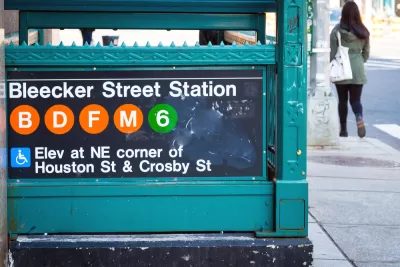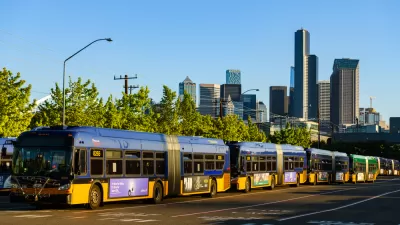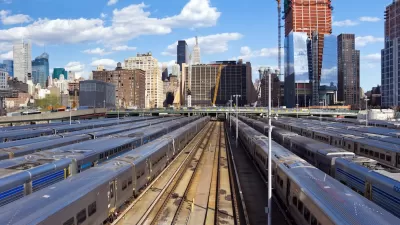Transit can advance social equity and provide access to opportunity—but only if agencies work for inclusive planning and resource allocation.

A new report from TransitCenter lays out guidelines for transit agencies seeking to better serve communities that have historically been cut out of planning and investment initiatives and that depend on public transportation. Angie Schmitt summarizes the report's six key recommendations for Streetsblog USA.
The broadest recommendation is to proactively address inequities across both system investment and agency leadership. "In many regions, suburban interests are overrepresented in transit agency leadership, skewing policy to favor well-off commuters from bedroom communities," Schmitt writes. "Decisions about major capital investment may also be dictated by property owners or other narrow constituencies whose interests don't align with providing good transit to people who need it."
Other recommendations include:
-
Progressive fares: To avoid disproportionately burdening the people who rely on transit the most, agencies should "fund transit budgets with progressive sources of revenue to the extent possible," Schmitt explains.
-
Decriminalize fare evasion: Transit agencies can follow the lead of Manhattan, D.C., and Portland, which have taken steps toward decriminalizing fare evasion. If fare payment is enforced, agencies should deploy agency staff rather than police in order to avoid potential escalation—and they should keep track of race and income of riders stopped or penalized.
-
Invest in affordable housing: TransitCenter recommends that agencies promote denser development and reduced parking requirements surrounding major transit stations. Because in metro areas like New York and California, transit-oriented development has been shown to fuel gentrification and displacement, the report also recommends promoting affordable housing.
FULL STORY: 6 Principles for a Transit System That Makes Your City More Fair and Just

Study: Maui’s Plan to Convert Vacation Rentals to Long-Term Housing Could Cause Nearly $1 Billion Economic Loss
The plan would reduce visitor accommodation by 25,% resulting in 1,900 jobs lost.

Alabama: Trump Terminates Settlements for Black Communities Harmed By Raw Sewage
Trump deemed the landmark civil rights agreement “illegal DEI and environmental justice policy.”

Why Should We Subsidize Public Transportation?
Many public transit agencies face financial stress due to rising costs, declining fare revenue, and declining subsidies. Transit advocates must provide a strong business case for increasing public transit funding.

Paris Bike Boom Leads to Steep Drop in Air Pollution
The French city’s air quality has improved dramatically in the past 20 years, coinciding with a growth in cycling.

Why Housing Costs More to Build in California Than in Texas
Hard costs like labor and materials combined with ‘soft’ costs such as permitting make building in the San Francisco Bay Area almost three times as costly as in Texas cities.

San Diego County Sees a Rise in Urban Coyotes
San Diego County experiences a rise in urban coyotes, as sightings become prevalent throughout its urban neighbourhoods and surrounding areas.
Urban Design for Planners 1: Software Tools
This six-course series explores essential urban design concepts using open source software and equips planners with the tools they need to participate fully in the urban design process.
Planning for Universal Design
Learn the tools for implementing Universal Design in planning regulations.
Smith Gee Studio
Alamo Area Metropolitan Planning Organization
City of Santa Clarita
Institute for Housing and Urban Development Studies (IHS)
City of Grandview
Harvard GSD Executive Education
Toledo-Lucas County Plan Commissions
Salt Lake City
NYU Wagner Graduate School of Public Service





























